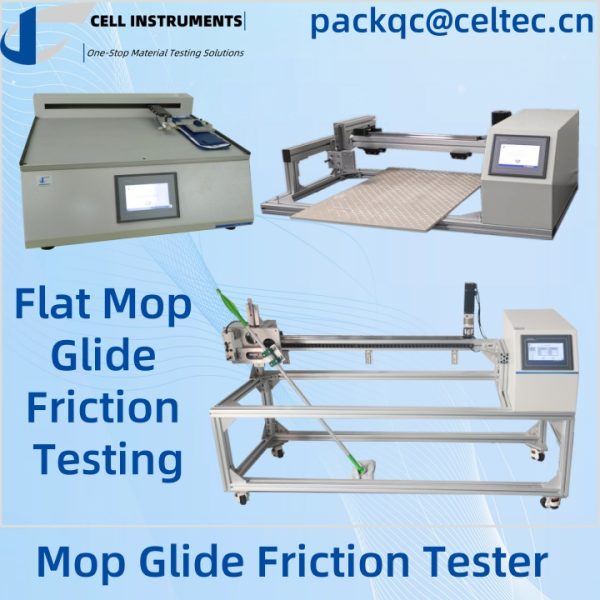Maximizing Efficiency with a Mop Glide Friction Tester: How It Improves Cleaning Performance
In the highly competitive world of cleaning product manufacturing, ensuring consistent quality and performance is critical. A mop glide friction tester plays a significant role in this process by testing the friction and cleaning efficiency of different mop materials. By simulating real-world cleaning conditions, manufacturers can evaluate the durability, effectiveness, and overall performance of their products before they reach the consumer. This tool is especially essential for industries ranging from household cleaning products to industrial and medical applications.
The Importance of Mop Glide Friction Testing
In mop manufacturing, ensuring that the material used provides enough friction for effective cleaning while remaining durable under repeated use is crucial. By utilizing a mop glide friction tester, manufacturers can test various materials under different surface conditions to determine their glide properties and effectiveness.
For instance, household flat mops are tested for their ability to clean floors efficiently without leaving streaks or causing excessive wear. The flat mop glide friction test measures how well the mop material maintains friction across different surfaces, such as wood, tile, and linoleum. By doing so, manufacturers can make informed decisions about the most suitable materials to use for different cleaning environments.
Key Features of the Mop Glide Friction Tester
The mop glide friction tester offered by Cell Instruments provides precise measurements and ensures reliable results. Below are some of its advanced features:
- 7-Inch Human-Machine Interface (HMI): With a touch screen, this interface simplifies the operation process, allowing users to input testing parameters quickly and efficiently.
- High-Precision Loadcell: The loadcell provides accurate real-time friction measurements, ensuring that each test produces reliable data.
- Adjustable Testing Speed: The machine’s speed can be adjusted according to the test requirements, allowing for realistic simulation of cleaning motions.
- Real-Time Data Display: Friction results are displayed continuously throughout the test, allowing operators to monitor performance.
- Easy Mobility: The machine is equipped with casters, allowing for easy transport between different testing stations.
Benefits of Using a Mop Glide Friction Tester
Using a mop glide friction tester offers a range of benefits for manufacturers focused on maintaining high standards for their cleaning products. These include:
- Improved Product Development: The data generated from friction testing allows manufacturers to refine the design and material composition of their mops. This leads to products that are not only more efficient but also longer-lasting.
- Enhanced Quality Control: By ensuring that all mops perform well under various testing conditions, manufacturers can guarantee that their products meet quality expectations before going to market.
- Cost Savings: Identifying and solving potential performance issues early in the development process reduces waste, lowers production costs, and minimizes the need for costly product recalls.
Applications in Different Industries
The mop glide friction tester is used across a range of industries that rely on effective cleaning solutions. Key sectors include:
- Household Cleaning Products: Manufacturers of household cleaning tools use the tester to evaluate the effectiveness of mops, ensuring they provide the right balance of friction and ease of movement for cleaning various surfaces.
- Industrial Cleaning Materials: Large-scale cleaning operations require durable materials that maintain consistent performance over time. The tester helps assess the lifespan and efficacy of industrial-grade mops.
- Medical and Pharmaceutical Industries: Cleaning in medical settings requires a high degree of precision and hygiene. The friction tester ensures that cleaning materials used in sterile environments meet necessary standards.
- Packaging and Textiles: The tester can be used to assess the friction performance of materials used for cleaning in packaging and textile maintenance.
The Testing Process Explained
To perform a flat mop glide friction test, the sample mop material is secured to the tester, and its performance is evaluated across different surfaces. The operator can adjust the speed and pressure to simulate different cleaning environments. Data is collected throughout the test, including the material’s friction resistance and wear. This detailed analysis allows manufacturers to assess cleaning efficacy and material longevity accurately.
Customization Options for Specific Needs
At Cell Instruments, we understand that every industry has unique testing requirements. We offer customization options for the mop glide friction tester to meet specific needs. Whether it’s tailored software to match particular testing protocols or custom fixtures for unique mop designs, our solutions ensure that your testing is both accurate and comprehensive.
FAQ:
1. What is the primary purpose of a mop glide friction tester?
A mop glide friction tester evaluates the friction and cleaning efficacy of mop materials, helping manufacturers ensure consistent quality and performance.
2. How does flat mop glide friction testing improve product development?
By providing precise data on how different mop materials perform on various surfaces, manufacturers can refine their products for better durability and cleaning efficiency.
3. Can the mop glide friction tester be used for industrial cleaning materials?
Yes, it is highly effective in testing industrial-grade mops, ensuring they meet the demands of large-scale cleaning operations.
4. What surfaces can be tested using the mop glide friction tester?
The tester can simulate a variety of surfaces, including wood, tile, and linoleum, to assess the mop’s performance in different environments.
5. Can I customize the mop glide friction tester for specific testing needs?
Yes, Cell Instruments offers customization options for software, testing programs, and fixtures to meet unique industry requirements.
Related Products
Related Article
Mop Coefficient of Friction Tester
Reference

